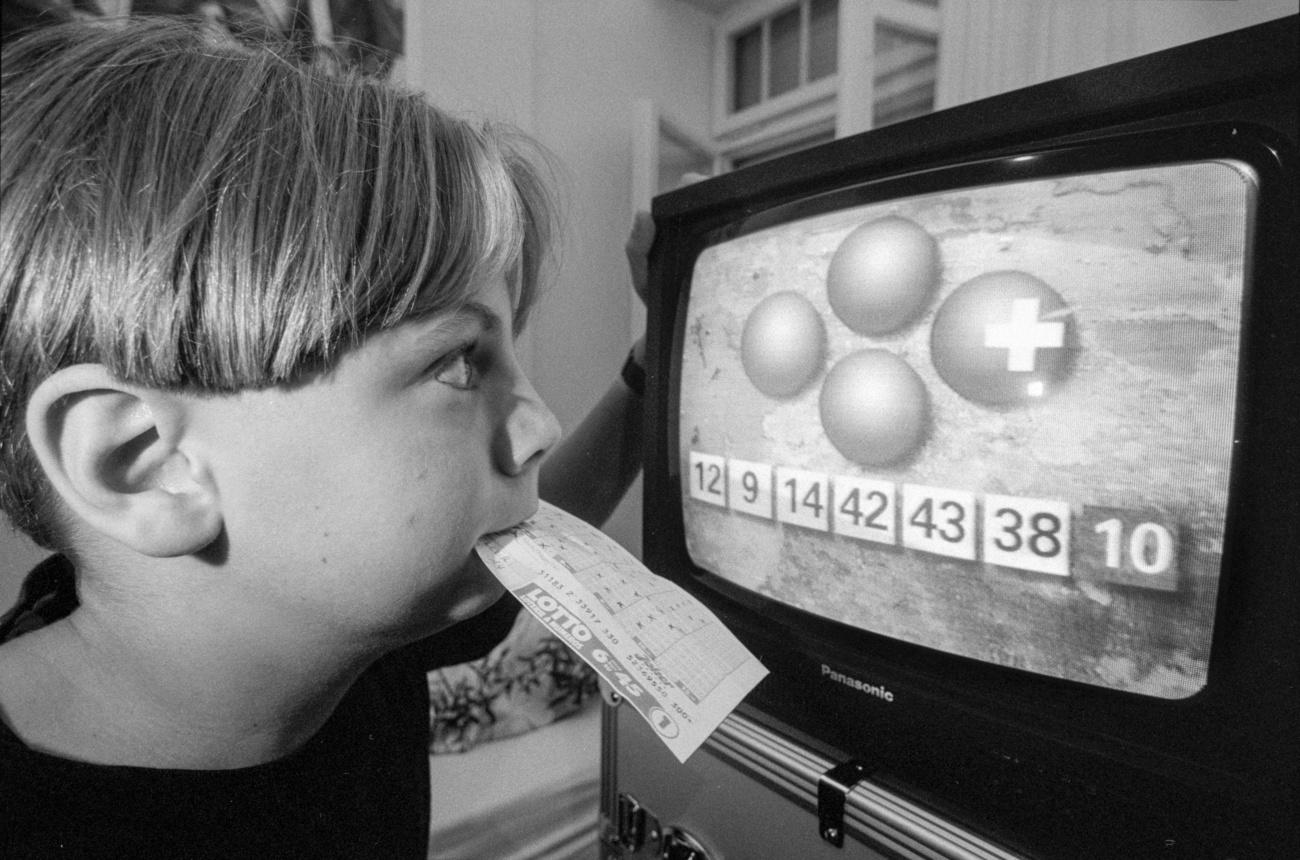More than a fifth of Swiss who bet on sports say they do it because they enjoy the excitement and the experience.
Keystone/Manuel Lopez
With the Euro 2024 football tournament and the Olympic Games just weeks away, bookmakers and punters are looking forward to a summer of betting on sports. But how easy is it to have a flutter in Switzerland?
The global sports betting market is massive – revenue is projected to reachExternal link more than $45 billion (CHF41.2 billion) this year and grow at more than 7% over the next five years. In Switzerland, government revenue from lotteries and sports is also increasing, and since this legally has to flow back into good causes, in theory (almost) everyone’s a winner.
How popular is sports betting in Switzerland?
While Switzerland isn’t in the same league as Australia, where every resident adult is estimated to loseExternal link on average almost $1,000 a year (mostly on gaming machines), the average Swiss spent CHF426 ($466) on lotteries and sports in 2022, according to a report by the Swiss Gambling Supervisory AuthorityExternal link. Sadly for them, they recouped only CHF293, resulting in an average net loss of CHF133.
More

More
Swiss Lotto – creating and dashing dreams for half a century
When it comes to motivation for betting on sports, for 40% of Swiss it’s the “desire to win money” (compared with 48% globally), according to the Sports Betting Survey in SwitzerlandExternal link, a representative survey carried out by market research firm TGM in October 2022. In addition, 22% of respondents said they enjoyed the excitement and the experience of sports betting and 17% said they were more interested in following a game after betting on it.
As for how often the Swiss place their bets, 25% of respondents said they had been involved in sports betting activities within the past 12 months. Of these, 13% bet on sports a few times a week, 10% once a month, and 49% a few times a year or less; 3% said they bet on sport every day.
How do people gamble on sports in Switzerland?
Almost 80% of fans who bet on sports do so via the internet or mobile apps, according to the TGM survey.
In 2018, three-quarters of Swiss voters approved an overhaul of the country’s gambling law. As a result, Swiss gamblers can bet online, for example at poker, only with Swiss casinos and lotteries that pay tax in Switzerland and take measures to protect people from addiction. Foreign sites, such as bet365, are automatically blocked by Swiss telecommunications service providers.
More

More
Swiss block 88 foreign online gaming sites
Swisslos (in German- and Italian-speaking Switzerland) and Loterie Romande (in the French-speaking part) are the only legal betting providersExternal link authorised to offer lotteries and sports betting in Switzerland. Players, who must be 18, can bet via the Sporttip (Swisslos) or Jouez Sport (Loterie Romande) websites, their apps, or at thousands of points of sales (such as newsagents) throughout the country. Highstreet bookmakers, such as William Hill in the UK, do not exist in Switzerland.
Swisslos says that since the new Gambling Law came into effect in 2019, most foreign betting providers have withdrawn from the Swiss market. “However, despite the new law, a few are still trying to lure Swiss customers to their websites in a targeted and illegal manner and circumvent Swiss laws,” it notes, warning that if you play with foreign betting providers, there’s no guarantee that your winnings will actually be paid out in the event of a dispute.
What’s more, winnings from foreign bookmakers are not tax-free – in Switzerland winnings from sports bets are now only taxable for income tax purposes above CHF1 million. Further information on tax rules for gambling winnings is available hereExternal link.
Why doesn’t Sporttip offer all bets and leagues like foreign betting providers?
The Swiss Gambling Supervisory Authority points outExternal link that offering betting on sports events that involve a “heightened risk of competition manipulation” is prohibited. To ensure that Swiss players don’t run the risk of becoming victims of match-fixing and to prevent money laundering through sports betting, the supervisory authority restricts the range of bets on offer.
Sporttip is therefore not allowed to offer individual sports bets and sporting events. However, all major leagues and important sporting events can be played legally, it says.
The 2024 UEFA European Football Championship (Euro 2024) takes place in ten cities around Germany from June 14 to July 14.
Twenty-four teams (including Switzerland) have qualified. The favourites, according to the bookmakersExternal link, are England, France and hosts Germany.
The 24 teams have been divided into six groups of four. All four teams in each group play each other once, with the top two in each group and the four best third-placed finishers progressing to the last 16. Switzerland’s three group matches are against Hungary (June 15), Scotland (June 19) and Germany (June 23).
The bookmakers expect Switzerland to come second in their group but to lose their last-16 match (thus failing to qualify for the quarterfinals).
At the time of writing, bookmakers are offering odds of 80-1 for Switzerland to lift the trophy in Berlin – the same as their neighbours and rivals Austria.
Also, unlike in Britain for example, in Switzerland punters can’t place bets on non-sporting eventsExternal link, such as the weather or the next prime minister.
What’s the idea behind Sporttip and Jouez Sport?
“Net revenues from sports betting must be used in their entirety for public benefit purposes,” says Article 106(6) of the Swiss Federal Constitution.
While operators of skill-based games may dispose of their net revenue as they please, the lottery organisations are legally obliged to use theirs for public benefit purposes – Swisslos says it supports more than 21,000 projects a year in the areas of culture, sports, social affairs and the environment.
Profit from Swisslos lotteries and sports bettingExternal link came to CHF511 million in 2023, up from CHF490 million the previous year. Of this, CHF56 million will be paid to the Swiss Sports Promotion Foundation, responsible for the distribution of contributions to national sport, and CHF455 million will be shared among the 20 Swisslos cantons and Liechtenstein.
That said, while more than CHF6 billion has gone to good causes since 1970, the system is not without its critics. A video by Swiss public television, SRFExternal link, showed how only 5% of the total goes towards small associations (sums of less than CHF10,000); a third of the money is paid out in amounts of at least CHF1 million, to institutions such as theatres, museums and concert halls. In canton Aargau CHF250,000 went towards celebrating the election of Doris Leuthard to the Federal Council in 2006, according to SRF.
Is gambling a problem in Switzerland?
Under Swiss law, a casino must issue a gambling ban if it knows a player is in debt or unable to meet their financial obligations. This also applies if the person gambles large amounts of money compared to their monthly income and fortune. Cantons are also obliged to take preventative measures and to offer counselling and treatment services for people with gambling addictions.
Nevertheless, anti-addiction groups say problematic online gambling habits have increased since the introduction of the new gambling law in 2019.
In 2018, 25% of the 1,395 people polled by Addiction Switzerland and a regional addiction association from western Switzerland said they gambled online weekly; by 2021 this had risen to 30%, the organisations said last year.
They were especially worried about the increase in what they called “problematic gamblers”, who had more than doubled from 2.3% to 5.2%. People aged 18 to 29 were most affected: around 19% of them displayed signs of moderately risky or problematic behaviour.
A majority of those surveyed cited two factors for their behaviour: the sharp increase in Swiss online gambling offerings under the 2019 law – foreign websites were blocked – and the Covid-19 pandemic and lockdowns, which drove people online. Respondents also mentioned the intensive marketing strategies of online gaming outlets.
More

More
Addiction groups say problematic online gambling has doubled
External Content

